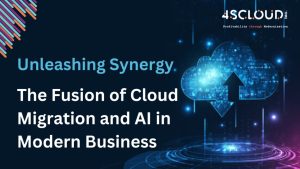
Introduction
In the contemporary business landscape, the strategic integration of Cloud Migration and Artificial Intelligence (AI) stands as a transformative force, reshaping how organizations operate and innovate. This article explores the symbiotic relationship between these two pillars of technology, showcasing their profound impact on scalability, efficiency, and strategic advantage.
The Power of Cloud Migration
Cloud Migration has become a linchpin for organizations aiming to modernize IT infrastructure, enhance scalability, and optimize costs. Leading cloud service providers, including Amazon Web Services (AWS), Microsoft Azure, and Google Cloud Platform (GCP), offer on-demand access to computing resources without the need for extensive hardware investments.
1. Scalability and Flexibility:
Platforms such as AWS SageMaker, Azure Machine Learning, and Google AI Platform enable organizations to execute AI workloads at scale. These tools facilitate optimal resource utilization and performance during the training and deployment of machine learning models.
2. Cost Optimization through Cloud Flexibility:
AWS Cost Explorer, Azure Cost Management, and Google Cloud Cost Management assist in monitoring and optimizing cloud expenditures effectively. The pay-as-you-go model aligns costs with resource consumption, ensuring cost-effectiveness.
3. Data Accessibility and Collaboration Amplified:
Cloud-based collaboration tools like AWS Data Exchange, Azure Data Share, and Google Cloud Data Catalog provide centralized repositories for seamless access to extensive datasets. This fosters collaboration and innovation across distributed teams.
4. Accelerated Development and Deployment with Cloud Services:
AWS AI/ML services, Azure Cognitive Services, and Google Cloud AI/ML APIs simplify the development and deployment of AI applications. These tools offer pre-built models and frameworks, expediting the development lifecycle.
5. Security and Compliance:
Leveraging AWS Key Management Service (KMS), Azure Key Vault, and Google Cloud KMS enhances data security and ensures compliance. Cloud providers invest significantly in security infrastructure, offering robust measures for data protection.
6. Edge Computing for Real-Time AI with Cloud Support:
Integrating edge computing with AWS IoT Greengrass, Azure IoT Edge, and Google Cloud IoT Edge allows organizations to deploy AI models locally on devices, reducing latency for real-time decision-making.
Case Studies
Organizations like Siemens Healthineers, Amazon, and JPMorgan Chase showcase successful integration.
1. Healthcare:
Siemens Healthineers utilizes AWS for scalable storage and computing power, employing AI for medical imaging analysis. The secure and compliant environment of AWS facilitates efficient processing of massive datasets.
2. Retail:
Amazon utilizes AWS for scalability and AI for personalized customer recommendations, exemplifying the seamless integration of cloud and AI technologies to enhance customer experiences.
3. Finance:
JPMorgan Chase leverages Azure for scalable cloud infrastructure and AI for fraud detection. The integration of cloud and AI enhances real-time analytics, positioning JPMorgan Chase competitively in the financial landscape.
Challenges and Considerations
1. Data Governance and Privacy:
AWS Data Governance, Azure Policy, and Google Cloud Data Loss Prevention tools enforce robust data governance and compliance with privacy regulations.
2. Skill Gaps:
AWS Training and Certification, Microsoft Learn, and Google Cloud Training programs address skill gaps, empowering teams to navigate the complexities of AI and cloud integration.
3. Integration Complexity:
AWS CloudFormation, Azure Resource Manager, and Google Cloud Deployment Manager streamline the integration of AI applications with cloud services, mitigating complexity.
4. Security Concerns:
AWS Security Hub, Azure Security Center, and Google Cloud Security Command Center offer centralized security management to identify and remediate threats, ensuring robust security protocols.
Conclusion
The strategic fusion of Cloud Migration and AI is not just a technological imperative but a strategic choice. As organizations navigate the digital age, this symbiotic relationship propels them into a future where innovation is synonymous with adaptability. Embracing this convergence positions businesses to lead and excel in an era defined by the fusion of cloud computing and artificial intelligence.
